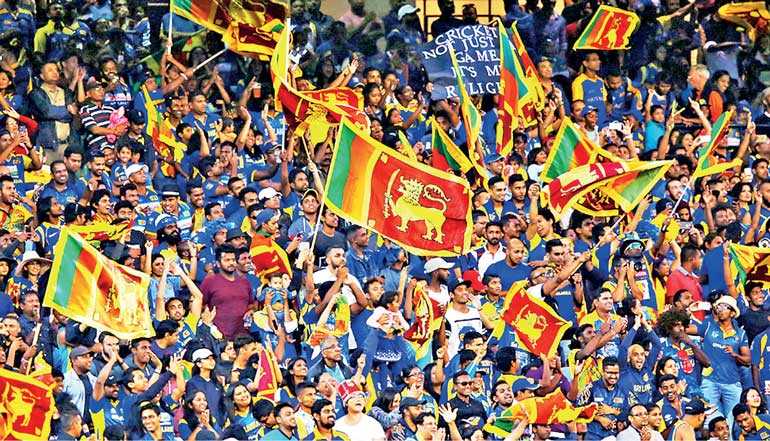Tuesday Feb 17, 2026
Tuesday Feb 17, 2026
Friday, 1 June 2018 00:00 - - {{hitsCtrl.values.hits}}

 Going by the newspaper reports it is obvious that our Cricket and the Board of Management in charge of overseeing it are in deep crisis. In recent times, the performance of the Sri Lankan side against other top teams has been below par, while the management of the sport leaves much to be desired. A sad situation, especially considering that this is the one sport in which we may compete in the international arena, more or less, on an equal footing. We seem to have gone south in our performing standards while the officialdom is evidently mired in self-promotion, deal making, and sleaze. Even match fixing is now being alleged, turning the game to a farce.
Going by the newspaper reports it is obvious that our Cricket and the Board of Management in charge of overseeing it are in deep crisis. In recent times, the performance of the Sri Lankan side against other top teams has been below par, while the management of the sport leaves much to be desired. A sad situation, especially considering that this is the one sport in which we may compete in the international arena, more or less, on an equal footing. We seem to have gone south in our performing standards while the officialdom is evidently mired in self-promotion, deal making, and sleaze. Even match fixing is now being alleged, turning the game to a farce.
Due to our intermittent success at international encounters in the past, the game of cricket came to be a national passion, even rivalling the frenzy of politics, the predominant obsession of the Sri Lankans. Politics is a career in this country, and a rewarding one at that. As interpreted here, it is an ‘anything goes’ game, with no fixed rules, and for that reason attracting mainly the unwholesome and the base elements of society.
To do well in the political arena, the aspirant must not only be well heeled must also be well backed by the power ‘brokers’ including the underworld. He must be possessed of low cunning, able to bend or ignore the law, including any moral code. The successful are assured of rich dividends and social advancement. With the reigns of the sporting body increasingly in the hands of national level politicians and their followers , the Board of Cricket now appears to be following suit, becoming a mere reflection of the corruption of national politics.
One immediate effect of this politicisation of a sports body is the obvious conflict of interest situation that arises thereby. In this country, several so called legislators and regulators are at the same time executives in various sporting bodies. In the morning wearing their legislative hats they sit together and set the rules. In the evening they wear a hat that of executives of sporting bodies. In the former role they dictate policy and wield considerable influence over government ministries, agencies and officials. In their evening role, as executives of sporting bodies, they are said to be under the supervision of the sports ministry and other regulators!
The Sports Ministry and other regulatory bodies are helpless when it comes to institutions like the Cricket Board and attempt to explain their inaction in verbiage. Obviously, they are reluctant to go against the powerful politicians holding office in sporting bodies. Some of these politicians also have direct or indirect control of media institutions and are not shy to use these connections to stifle and distort public opinion. It is even alleged that some hold beneficial interest in the gaming industry, a fundamentally corrupting activity in the field of sport, again a matter taken lightly by our so called regulatory bodies today.
Several politicians at the provincial level hold office in provincial cricket organisations. They thereby become eligible voters at the Cricket Board which is in the control of national level politicians. Often, both categories belong to the same political party or have common political interests, outside of cricket. In reality, it is a case of provincial politicians voting for a national level politician on a basis which is far from the interest of cricket, making a mockery of the idea of independent exercise of a delegate’s vote.
We had a glimpse into the prevailing culture of our sporting world when a former Minister of Sports was virtually caught with his pants down with a cheque of Rs. 1 million from the bond scam suspect Aloysius or a related company, with him. The Minister’s explanation was facile, he could not recall the benefactor, nor could he remember the process by which he cashed this huge cheque! He made the one million sound like a trifling sum, unworthy of ministerial attention!
At least on paper, the Cricket Board has a democratic framework including an Annual General Meeting at which delegates representing various provincial associations and affiliated clubs could vote the office bearers in. But experience has shown repeatedly that a mere democratic form does not guarantee a democratic substance. For the idea to have meaning there must be men, honourable and true, exercising their vote only with the long term interest of the game of cricket at heart. If they are the type of persons who are swayed by gifts, inducements and personal benefits they not only let down a great sport, but also themselves.
Sports is said to be character building. Not only the 11 young men on the field but all those involved in the conduct of the game; the coaches, office bearers and other stakeholders have a duty by the sport and an obligation to live by true sporting standards.
In sports, as much as the athletes on the field; the officials too will be judged not by the ethics of Sri Lankan politics, but by the far more exacting standards set by the spirit of sport. This is something developed through the years, even going back to distant Greek times. You may participate in a sport yet fail to grasp the essence of the thing. One way of understanding the spirit of sport is to compare it with an activity lacking in any standards, like our politics.
A long political career, some even spanning half a century, is a matter of boast among our politicians. If son follows father, or if brother finds public employment under brother, his politics is even nobler! In the 50 years of politics, the guy has become richer, travelled the world in five-star comfort and led a life far beyond his personal means. His children study overseas and even settle down there. He himself may become a dual citizen, owing an allegiance to another country. As interpreted in this country, longer the period as a public burden, greater the honour claimed! Even roads and public buildings may be named after him!
In sports, the opposite is the ideal, a long tenancy at a sporting body, heavier the badge of shame. You walk before given out, give others a chance, play by the rules, be a role model. More than the players, whose performance is in the open, it is the officials in the background who need to be watched in this country. It is they who must answer the call of duty, be standard setters in the spirit of sport.
In our reality, small men may gerrymander and fix elections at sports bodies and even succeed to hold office indefinitely. But the spirit of sport is something else, its concept and essence probably beyond the comprehension of such men.
“For when the one great scorer comes to mark against your name, he writes not that you won or lost, but how you played the game.”